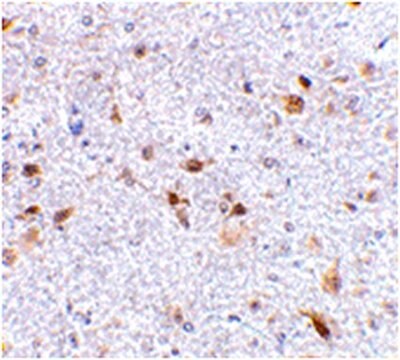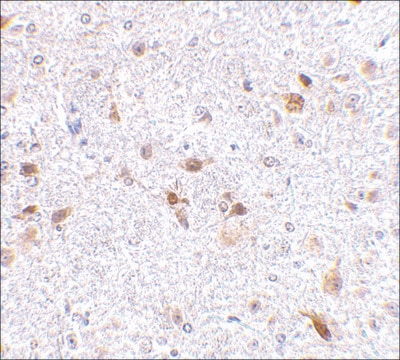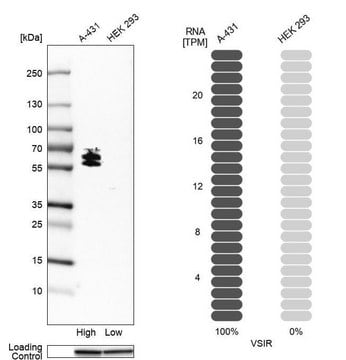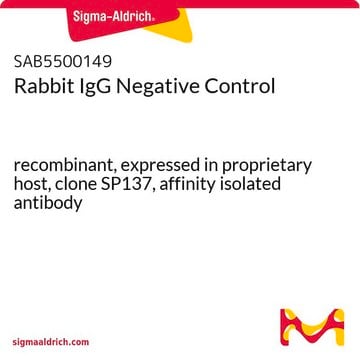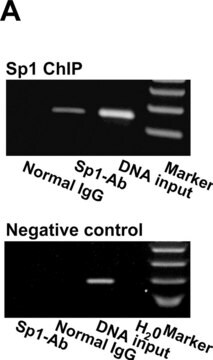추천 제품
생물학적 소스
mouse
Quality Level
항체 형태
purified immunoglobulin
항체 생산 유형
primary antibodies
클론
366C.12.9E5.E10.19.1F8, monoclonal
종 반응성
human
포장
antibody small pack of 25 μg
기술
immunohistochemistry: suitable (paraffin)
동형
IgG1κ
NCBI 수납 번호
UniProt 수납 번호
타겟 번역 후 변형
unmodified
유전자 정보
human ... PDCD1LG2(80380)
일반 설명
Programmed cell death 1 ligand 2 (UniProt: Q9BQ51; also known as PD-1 ligand 2, PD-L2, PDCD1 ligand 2, Programmed death ligand 2, Butyrophilin B7-DC, B7-DC, CD273) is encoded by the PDCD1LG2 (also known as B7DC, CD273, PDCD1L2, PDL2) gene (Gene ID: 80380) in human. Three isoforms of PD-L2 have been reported that are produced by alternative splicing. Isoforms 1 and 2 are single-pass type I membrane proteins and isoform 3 is a secreted protein. PD-1 and PD-1 ligands 1 and 2 (PD-L1 and PD-L2) are B7:CD28 family members that regulate T cell activation and peripheral tolerance. When engaged together with the TCR, the interaction of PD-1 with its ligands delivers an inhibitory signal to T cell proliferation and cytokine production. While PD-L1 is broadly expressed in hematopoietic and non-hematopoietic cells, PD-L2 expression is highly restricted to antigen presenting cells (APCs), including dendritic cells (DCs) and macrophages. The PD-1 pathway plays a key role in the progressive loss of effector T cell responses during chronic HIV infection. Under some conditions, blockade of this pathway can restore many T cell functions. PD-L2 is initially produced with signal peptide (aa 1-19) that is removed to produce the mature protein that contains a large extracellular region (aa. 20-220), a transmembrane domain (aa 221-241), and a cytoplasmic tail (aa 242-273).
특이성
Clone 366C.12.9E5.E10.19.1F8 specifically detects PD-L2 in human cells. It targets an epitope within the extracellular domain.
면역원
Epitope: extracellular domain
Recombinant protein fragment corresponding to the extracellular domain of human PD-L2 (as an Ig fusion protein).
애플리케이션
Anti-PD-L2, clone 366C.9E5, Cat. No. MABC1120, is a mouse monoclonal antibody that detects Programmed cell death 1 ligand 2 (PD-L2) and has has been tested for use in Immunohistochemistry (Paraffin).
Immunohistochemistry Analysis: A 1:250 dilution from a representative lot detected PD-L2 in human prostate tissue.
Immunohistochemistry Analysis: A representative lot detected PD-L2 in Immunohistochemistry applications (Sridharan, V., et. al. (2016). Cancer Immunol Res. 4(8):679-87; Roemer, M.G., et. al. (2016). J Clin Oncol. 34(23):2690-7; Chong, L.C., et. al. (2016). Blood. 128(9):1206-13; Calles, A., et. al. (2015). J Thorac Oncol. 10(12):1726-35).
Immunohistochemistry Analysis: A representative lot detected PD-L2 in Immunohistochemistry applications (Sridharan, V., et. al. (2016). Cancer Immunol Res. 4(8):679-87; Roemer, M.G., et. al. (2016). J Clin Oncol. 34(23):2690-7; Chong, L.C., et. al. (2016). Blood. 128(9):1206-13; Calles, A., et. al. (2015). J Thorac Oncol. 10(12):1726-35).
Research Category
Apoptosis & Cancer
Apoptosis & Cancer
품질
Evaluated by Immunohistochemistry (Paraffin) in human tonsil tissue.
Immunohistochemistry Analysis: A 1:250 dilution of this antibody detected PD1-L2 in human tonsil tissue.
Immunohistochemistry Analysis: A 1:250 dilution of this antibody detected PD1-L2 in human tonsil tissue.
표적 설명
30.96 kDa calculated.
물리적 형태
Format: Purified
Protein G purified
Purified mouse monoclonal antibody IgG1 in buffer containing 0.1 M Tris-Glycine (pH 7.4), 150 mM NaCl with 0.05% sodium azide.
저장 및 안정성
Stable for 1 year at 2-8°C from date of receipt.
기타 정보
Concentration: Please refer to lot specific datasheet.
면책조항
Unless otherwise stated in our catalog or other company documentation accompanying the product(s), our products are intended for research use only and are not to be used for any other purpose, which includes but is not limited to, unauthorized commercial uses, in vitro diagnostic uses, ex vivo or in vivo therapeutic uses or any type of consumption or application to humans or animals.
Not finding the right product?
Try our 제품 선택기 도구.
시험 성적서(COA)
제품의 로트/배치 번호를 입력하여 시험 성적서(COA)을 검색하십시오. 로트 및 배치 번호는 제품 라벨에 있는 ‘로트’ 또는 ‘배치’라는 용어 뒤에서 찾을 수 있습니다.
Selim Chaib et al.
Nature cancer, 5(3), 448-462 (2024-01-25)
Chemotherapy often generates intratumoral senescent cancer cells that strongly modify the tumor microenvironment, favoring immunosuppression and tumor growth. We discovered, through an unbiased proteomics screen, that the immune checkpoint inhibitor programmed cell death 1 ligand 2 (PD-L2) is highly upregulated
자사의 과학자팀은 생명 과학, 재료 과학, 화학 합성, 크로마토그래피, 분석 및 기타 많은 영역을 포함한 모든 과학 분야에 경험이 있습니다..
고객지원팀으로 연락바랍니다.